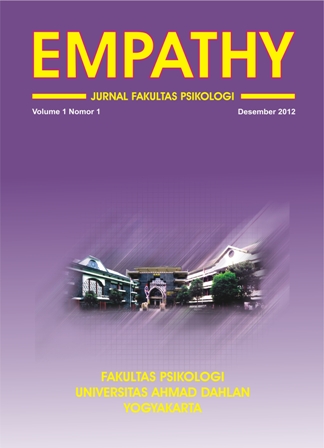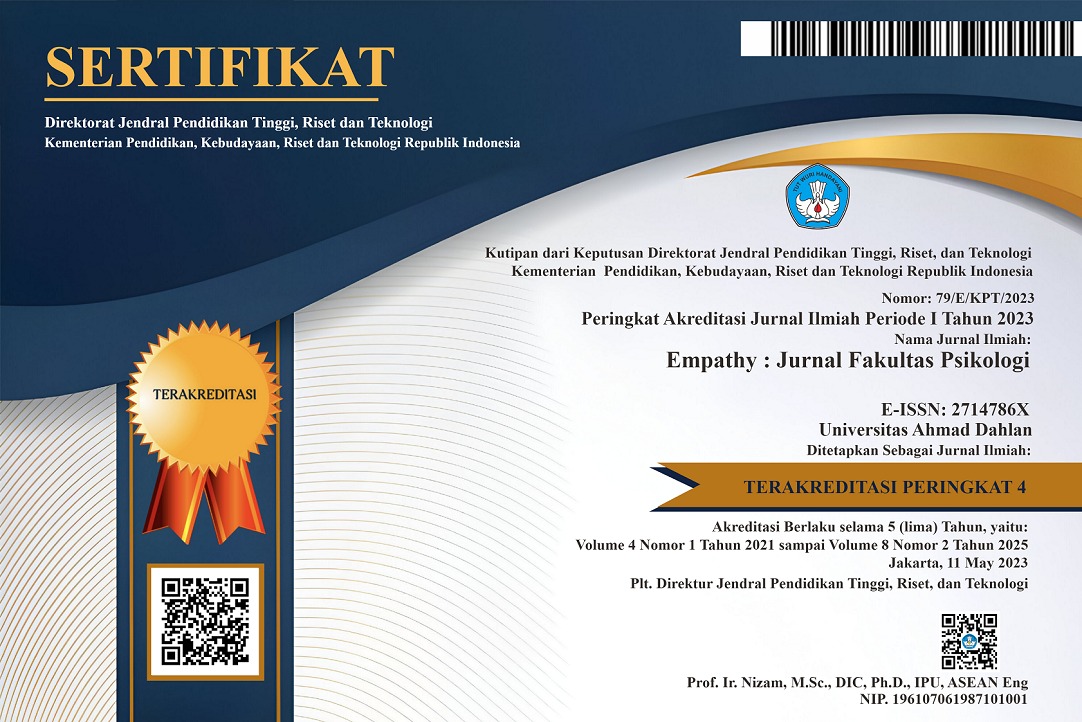A phenomenological investigation of the impact of study abroad experiences on the development of intercultural communication skills in college students
DOI:
https://doi.org/10.12928/empathy.v7i2.29460Keywords:
communication skills, cultural awareness, intercultural communication, psychological adaptationAbstract
Intercultural communication represents a significant challenge in the adaptation process for students studying outside their home regions. This study aims to examine the impact of studying abroad on the development of students' intercultural communication skills. A qualitative approach, utilizing a case study design, was employed for this research. The study involved four students who were currently studying abroad, selected through purposive sampling. Semi-structured interviews were conducted to gather insights from each participant. The analysis revealed four key themes: personality resilience, communication skills, psychological adaptation, and cultural awareness. The findings suggest that psychological resilience plays a crucial role in facilitating effective intercultural communication. Additionally, interpersonal communication skills are essential in this process. A common psychological challenge faced by students is homesickness, which can be mitigated by maintaining regular communication with family members. Studying abroad also enhances students' awareness of Indonesia's cultural diversity, prompting them to expand their understanding of different cultures, values, environments, and norms. This study underscores the importance of strengthening guidance and counseling services in higher education to support students' adaptation to new environments.
References
[1] Sari, A. C., Hartina, R., Awalia, R., Irianti, H., & Ainun, N. (2018). Komunikasi dan media sosial. Jurnal Messenger, 3(2), 69. [Online]. Available: https://www.researchgate.net/profile/Astari-Clara-Sari/publication/329998890_.pdf
[2] Adria, Y., & Sari, S. (2018). Analisis komunikasi antar budaya dalam ritual. Jurnal Profesi FIS UNIVED, 5(2), 15–24.
[3] Chen, G. (2009). Intercultural communication competence: Some perspectives of research. Howard Journal of Communications, 2(3), 243–261. https://doi.org/10.1080/10646179009359718
[4] Sujadi, E., Meditamar, M. O., Ahmad, B., & Rahayu, A. (2018). Pengaruh konsep diri dan locus of control terhadap motivasi berprestasi. Educational Guidance & Counseling Development Journal, 1(1), 32–51.
[5] Wahyuni, E. (2015). Hubungan self-efficacy dan keterampilan komunikasi dengan kecemasan berbicara di depan umum. Jurnal Komunikasi Islam, 5(1), 51–82.
[6] Alfaiz, A., et al. (2021). Identification of perceived self-efficacy to predict student’s awareness in career readiness. Islamic Guidance & Counseling Journal, 4(1), 124–132. https://doi.org/10.25217/igcj.v4i1.933
[7] Nuraini, C., Sunendar, D., & Sumiyadi, S. (2021). Tingkat culture shock di lingkungan mahasiswa Unsika. SAP (Susunan Artikel Pendidikan), 6(1). https://doi.org/10.30998/sap.v6i1.9909
[8] Muchtar, K., Koswara, I., & Setiaman, A. (2016). Komunikasi antar budaya dalam perspektif antropologi Islam. Jurnal Manajemen Komunikasi, 1(2), 94–104. https://doi.org/10.56146/dakwatussifa.v1i2.10
[9] Sartika, M., & Yandri, H. (2019). Pengaruh layanan bimbingan kelompok terhadap konformitas teman sebaya. Indonesian Journal of Counseling and Development, 1(1), 9–17. https://doi.org/10.32939/ijcd.v1i1.351
[10] Angraini, D., Juliawati, D., & Yandri, H. (2021). Peningkatan interaksi sosial dengan layanan bimbingan kelompok menggunakan media Zoom. Empathy: Journal of Psychology Faculty, 4(2), 72–83. https://doi.org/10.12928/empathy.v4i2.21831
[11] Lubis, S. A. S. (2019). Hadis Rasulullah seputar komunikasi antarbudaya. Jurnal Interaksi: Jurnal Ilmu Komunikasi, 3(1), 66–80. https://doi.org/10.30596/interaksi.v3i1.2698
[12] Volkova, E., Semushina, E. Y., & Tsareva, E. (2021). Developing cross-cultural communicative competence of university students in the globalized world. In M. E. Auer & T. Rüütmann (Eds.), Educating engineers for future industrial revolutions (pp. 405–416). Springer International Publishing.
[13] Heryadi, H., & Silvana, H. (2013). Komunikasi antarbudaya dalam masyarakat multikultur (Studi tentang adaptasi masyarakat migran Sunda di Desa Imigrasi Permu, Kecamatan Kepahiang, Provinsi Bengkulu). Jurnal Kajian Komunikasi, 1(1), 95–108.
[14] Taufiqqurrahman, M. F., & Setiawan, E. (2023). Adaptasi komunikasi antarbudaya mahasiswa Riau di Universitas Islam Bandung. Bandung Conference Series on Public Relations, 3(1), 151–155. https://doi.org/10.29313/bcspr.v3i1.6103
[15] Prabowo, A., & Fatonah, S. (2014). Kecemasan komunikasi dalam relasi antar etnik. Jurnal Ilmu Komunikasi, 13(3), 231–242.
[16] Wantiyastuti, A. E. (2021). Efektivitas komunikasi antarbudaya kalangan mahasiswa Nusa Tenggara Timur (NTT) dan mahasiswa Jawa di Yogyakarta. Caritas pro Serviam, 43(1), 58–70.
[17] Sujadi, E., Meditamar, M. O., & Ahmad, B. (2022). Pengaruh stres akademik dan self-efficacy terhadap penyesuaian diri santriwati Pondok Pesantren tahun pertama: Efek mediasi self-esteem. Indonesian Journal of Guidance and Counseling Theory and Applications, 11(3), 64–80. [Online]. Available: http://journal.unnes.ac.id/sju/index.php/jbk
[18] Saputri, A. F. R., Mustofa, M. B., & Wuryan, S. (2021). Adaptasi dan interaksi mahasiswa Pattani (Thailand) dalam tinjauan komunikasi antar budaya di Lampung. Jurnal Peurawi Media Kajian Komunikasi Islam, 4(2), 131–143.
[19] Natalia, F., Elena, R., Aleksey, G., & Olga, E. (2018). Cross-cultural communication in pre-university training of foreign students. Atlantis Press, 198, 260–265. https://doi.org/10.2991/ictppfms-18.2018.46
[20] Rizha, F. (2016). Adaptasi dan interaksi mahasiswa Aceh di Kota Bandung (Studi komunikasi antarbudaya). Jurnal As-Salam, 1(1), 115–123.
[21] Sitorus, N., Sianipar, V. M., & Others. (2023). Adaptasi fenomena culture shock pada mahasiswa PMM di Universitas Katolik Widya Mandala Surabaya. Community Development Journal, 4(2), 2590–2595. [Online]. Available: http://journal.universitaspahlawan.ac.id/index.php/cdj/article/view/14569
[22] Mukminin, A. (2012). Acculturative experiences among Indonesian graduate students in US higher education: Academic shock, adjustment, crisis, and resolution. Excellence in Higher Education, 3, 14–36. https://doi.org/10.5195/ehe.2012.64
[23] Sujadi, E. (2021). Stres akademik dan motivasi belajar mahasiswa mengikuti pembelajaran daring selama pandemi COVID-19. Educational Guidance & Counseling Development Journal, 4(1), 29–41.
[24] Yandri, H., Rahayu, G., Suhaili, N., & Netrawati. (2022). Kebermaknaan konseling kelompok dalam menanggulangi masalah kehidupan. Indonesian Journal of Counseling and Development, 4(2), 59–69. https://doi.org/10.32939/ijcd.v4i2.1526
[25] Sahanaya, C., Lessil, C. G., & Johan, A. (2023). Adaptasi dan perubahan perilaku siswa laki-laki dan perempuan di lingkungan sekolah menengah kejuruan Negeri 4 dan Negeri 5 Ambon. Jurnal BADATI Ilmu Sosial dan Humaniora, 8(1), 113–149.
[26] Lestari, R. J., Malau, V. R. R., Situmorang, C. Y., Manalu, A., & Siahaan, R. D. (2023). Penanggulangan gegar kultur PMM 2 ITB terhadap interaksi lingkungan dan budaya masyarakat setempat. Jurnal Pendidik dan Konseling, 5(2), 1009–1021.
[27] Devinta, M., Hidayah, N., & Hendrastomo, G. (2015). Fenomena culture shock (gegar budaya) pada mahasiswa perantauan di Yogyakarta. Jurnal Pendidikan Sosiologi, 1–15.
[28] Zzulfa, Z., Hasyim, I., & Maulida, R. (2022). Pentingnya kepekaan budaya untuk mewujudkan entry point dalam konseling lintas budaya. In Prosiding Seminar Nasional Bimbingan dan Konseling Universitas Negeri Malang: Promosi Layanan Konseling Berbasis Kabar Gembira dalam Era Pluralisme (pp. 272–280).
[29] Fong, J. (2020). An evaluation of an education abroad program on the intercultural learning and cross-cultural adaptability skills of university undergraduates. Higher Education Evaluation and Development, 14(2), 55–68. https://doi.org/10.1108/HEED-01-2020-0002
[30] Miles, M. B., Huberman, A. M., & Saldaña, J. (2014). Qualitative data analysis: A methods sourcebook (3rd ed.). SAGE Publications.
[31] Chen, G. (2009). Intercultural communication competence: Some perspectives of research. Howard Journal of Communications, 2(3), 243–261. https://doi.org/10.1080/10646179009359718
[32] Sagiv, L., & Schwartz, S. H. (2022). Personal values across cultures. Annual Review of Psychology, 73, 517–546. https://doi.org/10.1146/annurev-psych-020821-125100
[33] Xu, Y. (2023). Exploration on the effective path of cultivating college students' English intercultural communication ability. International Journal of Science, Engineering and Applied Sciences, 12(06), 58–60. https://doi.org/10.7753/ijsea1206.1016
[34] Thaumaet, Y. A., & Soebijantoro, S. (2019). Akulturasi budaya mahasiswa dalam pergaulan sosial di kampus (Studi pada mahasiswa program studi pendidikan sejarah Universitas PGRI Madiun). Agastya Jurnal Sejarah dan Pembelajarannya, 9(1), 113. https://doi.org/10.25273/ajsp.v9i1.3641
[35] Simatupang, O., Lubis, L. A., & Wijaya, H. (2015). Gaya berkomunikasi dan adaptasi budaya mahasiswa Batak di Yogyakarta. Jurnal Komunikasi ASPIKOM, 2(5), 314–329.
[36] Yeke, S., & Semerciöz, F. (2016). Relationships between personality traits, cultural intelligence, and intercultural communication competence. Procedia - Social and Behavioral Sciences, 235, 313–319. https://doi.org/10.1016/j.sbspro.2016.11.036
[37] Fedorova, E. A., et al. (2019). Formation of technologies for the use of intercultural communication. International Journal of Engineering and Advanced Technology, 9(1), 4532–4532. https://doi.org/10.35940/ijeat.a1785.109119
[38] Khukhlaev, О. Е., Gritsenko, V., Pavlova, О. С., Tkachenko, N. V., Usubian, S. A., & Шорохова, В. А. (2020). Comprehensive model of intercultural competence: Theoretical substantiation. RUDN Journal of Psychology and Pedagogics, 17(1), 13–28. https://doi.org/10.22363/2313-1683-2020-17-1-13-28
[39] Liu, H. (2021). Current situation and cultivation strategies of college students' intercultural communication competence under the "One Belt and One Road" strategy. International Journal of Frontiers in Sociology, 3(10), 100–102. https://doi.org/10.25236/IJFS.2021.031018
[40] Patawari, M. Y. (2020). Adaptasi budaya pada mahasiswa pendatang di kampus Universitas Padjadjaran Bandung. Jurnal Manajemen Komunikasi, 4(2), 103–122. https://doi.org/10.24198/jmk.v4i2.25900
[41] Salsabila, N. I., Mumtahanah, R., & Nasichah. (2023). Analisis perbedaan kemampuan penyesuaian diri mahasiswa perantau dan mahasiswa lokal program studi bimbingan dan penyuluhan Islam di tahun pertama perkuliahan. Jurnal al-Shifa Bimbingan Konseling Islam, 4(2), 61–75. https://doi.org/10.32678/alshifa.v4i2.9595
[42] Melati, N. T., Safitri, N., & Ulfiati, L. (2021). Profiling intercultural communication as global competence for Indonesian university students. In Proceedings of the 3rd Green Development International Conference (GDIC 2020) (pp. 8). Atlantis Press. https://doi.org/10.2991/aer.k.210825.008
[43] Paternotte, E., Scheele, F., van Rossum, T. R., Seeleman, M. C., Scherpbier, A., & van Dulmen, S. (2016). How do medical specialists value their own intercultural communication behaviour? A reflective practice study. BMC Medical Education, 16(1). https://doi.org/10.1186/s12909-016-0727-9
[44] Mareza, L., & Nugroho, A. (2016). Minoritas ditengah mayoritas (strategi adaptasi sosial budaya mahasiswa asing dan mahasiswa luar Jawa di UMP). Jurnal Ilmiah LPPM UST Yogyakarta, 2(2), 27–34. https://doi.org/10.30738/sosio.v2i2.549
[45] Fajrianti, I. N., et al. (2023). Analisa kecepatan beradaptasi dalam belajar di perkuliahan pada mahasiswa baru prodi pendidikan luar sekolah UNNES 2023. Jurnal Pendidikan Teknologi, 3(2), 161–172.
[46] Tinus, A. A. (2021). Adaptasi sosial mahasiswa Sabah dalam lingkungan Universitas Bosawa. Universitas Bosowa Makassar.
[47] Wahyuni, A. S., Ningindah, S. R. D., & Merliyanti, R. (2023). Culture shock dan hambatan komunikasi pada mahasiswa perantau di Universitas Garut. Jurnal Sosial, 4(2), 85–94.
[48] Itasari, A. (2023). Intercultural communication of Nusantara module students at Slamet Riyadi University. Formosa Journal of Applied Sciences, 2(5), 593–600. https://doi.org/10.55927/fjas.v2i5.3964
[49] Lindsey, E. W. (2005). Study abroad and values development in social work students. Journal of Social Work Education, 41(2), 229–249. https://doi.org/10.5175/jswe.2005.200303110
[50] Nor, R. M., & Mustafa, Z. B. (2013). Moving beyond on home country: Developing global citizenship through international learning in Japan. Journal of Education and Learning, 7(3), 135–146. https://doi.org/10.11591/edulearn.v7i3.178
Downloads
Published
Issue
Section
License
Copyright (c) 2024 Dea Harmanda, Eko Sujadi, Hengki Yandri

This work is licensed under a Creative Commons Attribution-ShareAlike 4.0 International License.
Authors who publish with Empathy: Jurnal Fakultas Psikologi agree to the following terms:
- Authors retain copyright and grant the journal right of first publication with the work simultaneously licensed under a Creative Commons Attribution License (CC BY-SA 4.0) that allows others to share the work with an acknowledgment of the work's authorship and initial publication in this journal.
- Authors are able to enter into separate, additional contractual arrangements for the non-exclusive distribution of the journal's published version of the work (e.g., post it to an institutional repository or publish it in a book), with an acknowledgment of its initial publication in this journal.
- Authors are permitted and encouraged to post their work online (e.g., in institutional repositories or on their website) prior to and during the submission process, as it can lead to productive exchanges, as well as earlier and greater citation of published work.

This work is licensed under a Creative Commons Attribution-ShareAlike 4.0 International License.




